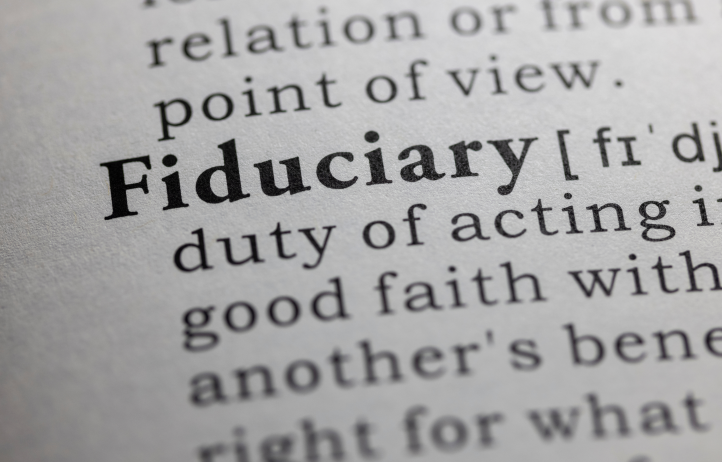FINANCIAL KNOWLEDGE IS PUT TO THE TEST ON TV GAME SHOW
Jeopardy!, a show that bills itself as “America’s Favorite Quiz Show,” tests the knowledge of contestants on a wide range of topics by offering up a descriptive answer and seeking the “question” as a response. During the 2022 Tournament of Champions, the $600 answer in the category of “abbreviated jobs” was: “Advises on investing and saving for the future: CFP.” The correct reply was: “What is a CERTIFIED FINANCIAL PLANNER™?”
A few months later, contestants were challenged with the category of “finance and investing” during the Double Jeopardy! round. The $2000 answer was: “To earn trust, many investment companies make it front and center that they’re this type of advisor obligated to act in a client’s interest.” The correct reply was: “What is a fiduciary?”
So, how would you do as a contestant on Jeopardy!?
You may have heard the terms “CERTIFIED FINANCIAL PLANNER™” professional and “fiduciary” before, but do you have a clear understanding of what these titles mean and why they are so important when you are working with your financial advisor?
Maintaining a relationship with an advisor should be an experience that brings you peace of mind and is a partnership you can count on. A fiduciary is legally obligated to act in the best interests of their client. Not all financial professionals are fiduciaries, but any advisor who has passed the CERTIFIED FINANCIAL PLANNER™ exam is one.
What exactly is a CERTIFIED FINANCIAL PLANNER™ professional?
A CERTIFIED FINANCIAL PLANNER™ professional (CFP®) is a financial planner who has verifiable credibility and is held to high standards in personal financial planning. The Certified Financial Planner Board of Standards, Inc. (CFP Board) is a non-profit organization that sets and enforces requirements for certification. The CFP Board states that “CFP® professionals meet rigorous education, training and ethical standards, and are committed to serving their clients’ best interests today to prepare them for a more secure tomorrow.”
What is the difference between a CERTIFIED FINANCIAL PLANNER™ practitioner and a financial advisor?
There are many titles to describe financial professionals. It can be confusing when so many of the terms are used interchangeably. There are financial advisors, financial planners, investment advisors, portfolio managers, wealth managers and many others. All financial planners are financial advisors, but not all financial advisors obtain their CERTIFIED FINANCIAL PLANNER™ certification. To make things even more confusing, anyone can call themselves a financial advisor. A quick search on Google or YouTube confirms that there are many people out there calling themselves experts and giving advice – some more qualified than others.
Only financial planners who have met the criteria of the CFP Board can earn a CERTIFIED FINANCIAL PLANNER™ certification.
A financial professional who has obtained the right to use the CFP® mark is someone who has thousands of hours of professional experience in addition to their formal education. They have passed an exam, submitted to a background check and abides by professional ethics established by the CFP Board.
What are some benefits of working with a CERTIFIED FINANCIAL PLANNER™ professional?
- A CFP® practitioner is committed to working as a fiduciary. This means that they are bound to put your interests first and always offer conflict-free guidance. The CFP Board holds CERTIFIED FINANCIAL PLANNER™ certificants to these standards:
- Loyalty. A CFP® professional must put your interests before their own.
- Care. A CERTIFIED FINANCIAL PLANNER™ practitioner must consider your personal circumstances, risk tolerance, and the goals you are trying to achieve and offer their professional guidance in consideration of your needs.
- Follow client instructions. Once you have entered into an agreement to work with a CFP® professional, they will abide by the set terms and will follow any reasonable and lawful directions a client gives.
- A financial advisor who has earned the CERTIFIED FINANCIAL PLANNER™ certification is qualified to help guide you in making financial decisions. In becoming certified, a CFP® professional has demonstrated their expertise in a variety of financial planning and wealth management areas including saving for education, complex tax strategies, estate planning, retirement and portfolio management. They are qualified to help you make an informed plan that puts you on a path to achieve your goals.
All Shareholders at Frisch Financial hold the CFP® designation.
As we are committed to providing the best level of service to all of our clients, all of our Shareholders are CERTIFIED FINANCIAL PLANNER™ professionals. David Frisch earned his certification in 1994, Joyce Streithorst in 1995, Jason Sacks in 2010 and Shawn Gallagher in 2013. You can be assured that we are all held to a high industry standard and are committed to working on your behalf.
“Certified Financial Planner Board of Standards, Inc. (CFP Board) owns the certification marks CFP® and CERTIFIED FINANCIAL PLANNER™ in the United States, which it authorizes use of by individuals who successfully complete CFP Board’s initial and ongoing certification requirements.


